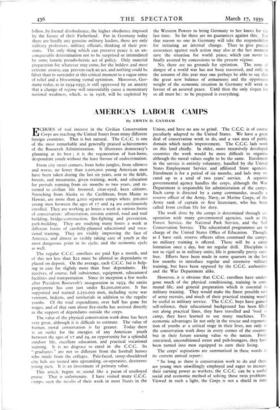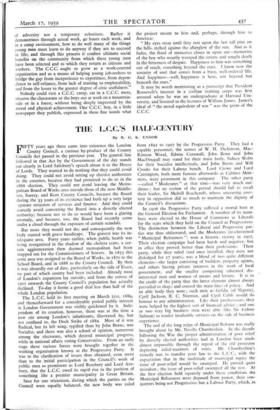AMERICA'S LABOUR CAMPS
By ERWIN D. CANHAM
ECHOEECHOES of real interest in the Civilian Conservation S Corps are reaching the United States from many different foreign countries. That is but natural. The C.C.C. is one of the most remarkable and generally praised achievements of the Roosevelt Administration. It illustrates democracy's planning at its best ; it is the regeneration of foot-loose, despondent youth without the least flavour of endoctrination.
From city street corners, from hobo jungles, from idleness and worse, no fewer than 2,000,000 young American men have been taken during the last six years, sent to the fields, forests, and mountains, given training, work, and education for periods running from six months to two years, and re- turned to civilian life bronzed, clear-eyed, keen citizens. Stretching from Alaska to the Caribbean, from Maine to Hawaii, are more than 4,000 separate camps where 300,000 young men between the ages of 17 and 24 are continuously enrolled. They are working 4o hours a week at various forms of conservation: afforestation, erosion control, road and trail building, bridge-construction, fire-fighting and prevention, park-building. They are studying many hours a week at different forms of carefully-planned educational and voca- tional training. They are visibly improving the face of America, and almost as visibly taking care of youth at the most dangerous point in its cycle, and the economic cycle as well.
The regular C.C.C. enrollees are paid $3o a month, and of this not less than $22 must be allotted to dependants or placed on deposit. On the average, each C.C.C. lad is help- ing to care for slightly more than four dependants. He receives, of course, full subsistence, equipment, educational facilities and transportation. Since its inception a few weeks after President Roosevelt's inauguration in 1933, the entire programme has cost just under $2,000,000,000. It has supported and trained 2,250,000 men, including some war veterans, Indians, and territorials in addition to the regular youths. Of the total expenditure, over half has gone for wages, and of that sum about five-sixths has assisted directly in the support of dependants outside the corps.
The value of the physical conservation work done has been very great, although it is difficult to estimate. The value of human, moral conservation is far greater. Today there is an outlet for the energies of any American youth between the ages of 17 and 24, an opportunity for a splendid outdoor life, excellent education, and practical vocational training. It is no disgrace to enrol in the C.C.C. Its " graduates " are not so different from the football heroes who stride from the colleges. Pale-faced, stoop-shouldered city lads are turned into upstanding, co-operative, dexterous young men. It is an investment of primary value.
This article begins to .sound like a paean of unalloyed praise. That is unfortunate. I have visited many C.C.C. ramps. seen the results of their work in most States in the Union, and have no axe to grind. The C.C.C. is of course peculiarly adapted to the United States. We have a great deal of conservation work to do, and a vast area of public domain which needs improvement. The C.C.C. lads work on this land chiefly. In older, .more intensively developed countries the work would be more difficult to organise although the moral values ought to be the same. Enrolment in the service is entirely voluntary, handled by the United States Employment Service and affiliated State agencies. Enrolment is for a period of six months, and lads may re- enrol up to a total of two years' service. A separate governmental agency handles the corps, although the War Department is responsible for administration of the camps. Each camp is directed by a camp commander, usually a reserve officer of the Army, Navy, or Marine Corps, of the Army rank of captain or first lieutenant, who has been called from civilian life for duty.
The work done by the camps is determined through co- operation with many governmental agencies, such as the Forest Service, the National Park Service, and the Sod Conservation Service. The educational programmes are in charge of the United States Office of Education. Though. as I have said, reserve officers often command the camps. no military training is offered. There will be a camp formation once a day, but no regular drill. Discipline is not so rigid as in military units; life is generally pretty care- free. Efforts have been made in some quarters in the last few months to introduce regular and extensive military training, but have been opposed by the C.C.C. authoritie', and the War Department alike.
However, it is obvious that C.C.C. enrollees have under- gone much of the physical conditioning, training in com- munal life, and general preparation which is essential to military training. They would make the finest possible sort of army recruits, and much of their practical training would be useful to military service. The C.C.C. boys have gained self-reliance, their educational background has been filled out along practical lines, they have travelled and lived camp, they have learned to use many machines. Th. economic advantages lie not only in the rescue and regenera tion of youths at a critical stage in their lives, not only ir the conservation work done in every corner of the country but in their future earning value to the nation. Fron. untrained, unconditioned street and pub-loungers, they hay( been turned into men equipped to earn their living.
The corps' aspirations are summarised in these words in its current annual report : " So long as there is conservation work to do and thene are young men unwillingly employed and eager to increask. their earning power as workers, the C.C.C. can be a useful social and economic method of solving these twin problems. Viewed in such a light, the Corps is not a shield in time of adversity nor a temporary substitute. Rather it demonstrates through actual work, 4o hours each week, and in a camp environment, how to do well many of the things young men must learn to do anyway if they are to succeed in life; and through this process it confers ultimate social benefits on the community from which these young men have been selected and to which they return as citizens and workers. The C.C.C. ought to grow as a work-centred organisation and as a means of helping young job-seekers to bridge the gap from inexperience to experience, from depen- dence to self-reliance, from lack of training to employability, and from the lesser to the greater degree of civic usefulness."
Nobody could visit a C.C.C. camp, eat in a C.C.C. mess, observe the classrooms or the boys out at work on a mountain- side or in a forest, without being deeply impressed by the moral and physical achievement. One C.C.C. boy, in a little newspaper they publish, expressed in these fine words what the project meant to him and, perhaps, through him to America : " My eyes stray until they rest upon the last tall pine on the hills, etched against the afterglow of the sun. And as it fades, the flood of memories closes in upon me—memories of the boy who wearily tramped the streets and sought death in the bitterness of despair. Happiness to him was something out of reach, something beyond the stars. I know now the serenity of soul that comes from a busy, well-ordered life. And happiness—well, happiness is here, not beyond but beneath the stars."
It may be worth mentioning as a postscript that President Roosevelt's interest in a civilian training corps was first aroused when he was an undergraduate at Harvard Uni- versity, and listened to the lectures of William James. James's ideal of " the moral equivalent of war " was the germ of the C.C.C.











































 Previous page
Previous page